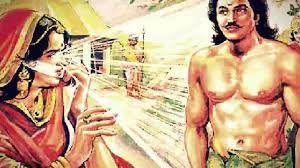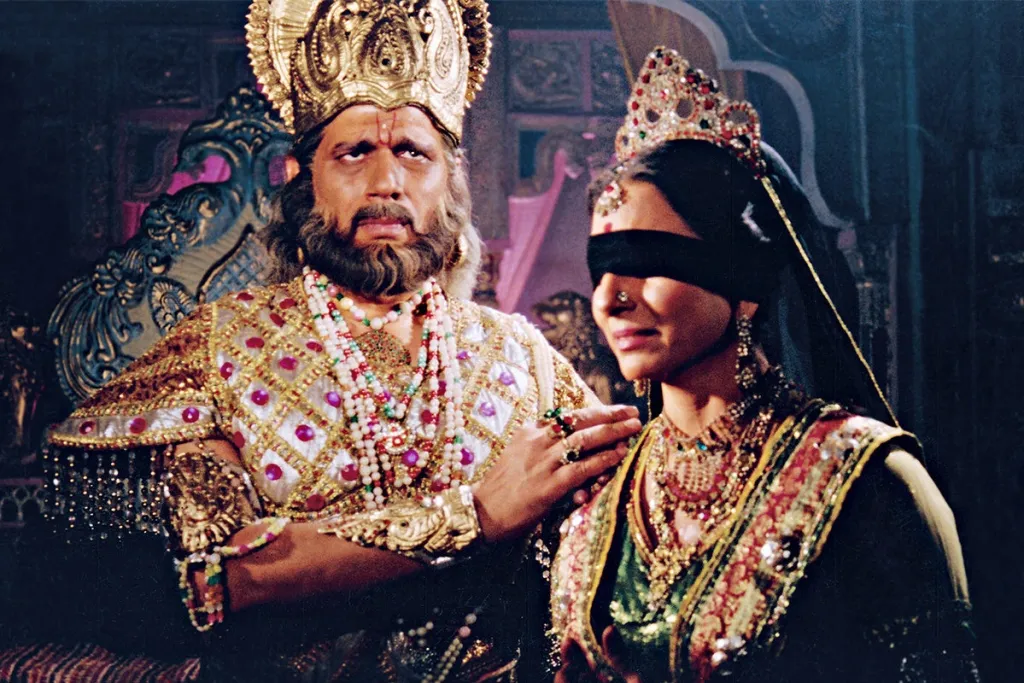Among the many powerful women in the Mahabharata, Gandhari stands as one of the most intriguing and tragic figures. She was a woman of immense strength, unwavering devotion, and profound wisdom. Yet, her life was marked by sacrifices that defined not only her destiny but also the fate of the Kauravas and the outcome of the great war of Kurukshetra.
Gandhari was the queen of Hastinapura, the wife of Dhritarashtra, and the mother of the Kauravas. Her decision to blindfold herself for life, her helplessness in restraining her eldest son Duryodhana from his path of destruction, and her heartbreaking loss of all her sons make her story one of deep sorrow and philosophical reflection.
In this blog, we will explore the life of Gandhari, her choices, struggles, and the invaluable lessons she leaves behind.
Where was Gandhari from?
Gandhari was born as a princess of the kingdom of Gandhara (present-day Kandahar, Afghanistan), the daughter of King Subala. From an early age, she was known for her wisdom, piety, and strong moral character.
A prophecy predicted that she would give birth to a hundred sons, a revelation that both fascinated and troubled those who heard it. Despite her noble lineage and virtues, she was married off to Dhritarashtra, the blind prince of Hastinapura. This alliance was politically motivated, strengthening the ties between Gandhara and Hastinapura.
However, upon realizing that her husband was blind, Gandhari made a decision that would forever define her life—she voluntarily blindfolded herself, vowing to share his darkness. But was this an act of ultimate love, silent defiance, or a protest against the injustice of her fate?
Why did Gandhari Blindfold herself?
Gandhari’s decision to blindfold herself remains one of the most debated aspects of her character.
Was it an act of unparalleled devotion to her husband, ensuring she never enjoyed a privilege he was deprived of? Or was it a symbolic protest against being married to a blind man without her consent? Some interpretations suggest that her act was a quiet rebellion, an assertion of her agency in a life that had been decided for her.
Regardless of her motivation, her choice significantly impacted her life. She remained dependent on her maids for guidance, unable to witness the world around her. More importantly, she could not directly see her children, a loss that added to her pain as a mother.
Despite her physical blindness, Gandhari was far from powerless. She carried herself with grace and wisdom, earning the respect of elders like Bhishma and Vidura. But as a mother, she would soon face trials far more challenging than blindness.
How did Gandhari gave birth to 100 Kauravas?
Gandhari’s motherhood was anything but ordinary. After conceiving, she carried her pregnancy for an astonishing two years without delivering a child. Frustrated and heartbroken, she struck her womb in despair, leading to the premature birth of a hard mass.
Sage Vyasa intervened and divided this mass into 101 pieces, placing them in jars of ghee. Over time, these pieces developed into the 100 Kaurava sons and one daughter, Dushala.
Among her sons, Duryodhana was the most powerful and ambitious. Gandhari loved him deeply but also foresaw the destruction he would bring. When he was born, she heard the ominous cries of animals, signaling ill fate. Despite warnings from sages, she could not bring herself to abandon her son. This was perhaps her greatest internal struggle—her love for her son versus her wisdom that recognized his faults.
Throughout the Mahabharata, Gandhari tried to guide Duryodhana on the path of dharma, but he often ignored her advice, influenced instead by Shakuni, his cunning maternal uncle.
What was Gandhari’s Role in the Kurukshetra War
As the war between the Pandavas and Kauravas became inevitable, Gandhari repeatedly pleaded for peace. She was aware that war would result in immense bloodshed and the downfall of the Kuru dynasty. But despite her efforts, fate had its course.
During the war, she remained in Hastinapura, praying for her sons’ well-being. Every day, she received devastating news about their deaths. Her grief and suffering were immeasurable.

Why did Gandhari removed her blindfold once during the war?
Gandhari removed the blindfold to strengthen Duryodhana, her last remaining son, before his fight with Bhima. She wished that the energy she had accumulated while blindfolded would imbue the first thing she looked at with power.
Why did Gandhari curse Krishna?
Perhaps the most heart-wrenching moment came when she learned about the death of her last surviving son, Duryodhana. Enraged and heartbroken, she confronted Lord Krishna, holding him responsible for allowing the war to happen. In her sorrow, she cursed that his own Yadava clan would perish in a similar fate—a prophecy that later came true.
After the war, when Yudhishthira came to seek her blessings, Gandhari, in a moment of profound grief, cursed him as well. Despite knowing that he followed dharma, she lamented that he survived while her hundred sons perished.
Gandhari’s Legacy and Lessons from Her Life
Gandhari’s story is one of profound strength, resilience, and silent suffering. Her life teaches us several powerful lessons:
- Duty vs. Individual Will: Gandhari represents the struggle between personal choice and societal expectations. Her decision to blindfold herself was both an assertion of her autonomy and a sacrifice to fit into the role of a devoted wife.
- Motherhood and Morality: Her unconditional love for Duryodhana blinded her to his faults, teaching us the importance of balancing love with moral guidance.
- The Power of Words and Curses: Her curses, given in moments of deep grief, show how emotional turmoil can have lasting consequences.
- Resilience and Grace: Despite her suffering, she upheld her dignity, guided her family, and accepted her fate with strength.
Gandhari’s journey is one of love, sacrifice, and sorrow. She started as a powerful princess, became a devoted queen, and ended as a grieving mother who lost everything. Her story is a reminder that even in the grand narratives of destiny, the silent struggles of individuals shape the course of history.
As we reflect on Gandhari’s life, we see a woman who bore immense pain with grace. She teaches us about the fine balance between love and righteousness, devotion and individuality, fate and free will. Her legacy continues to inspire, urging us to find strength even in our darkest moments.
In a world where choices define destinies, Gandhari remains a poignant reminder of the power of silent strength.

